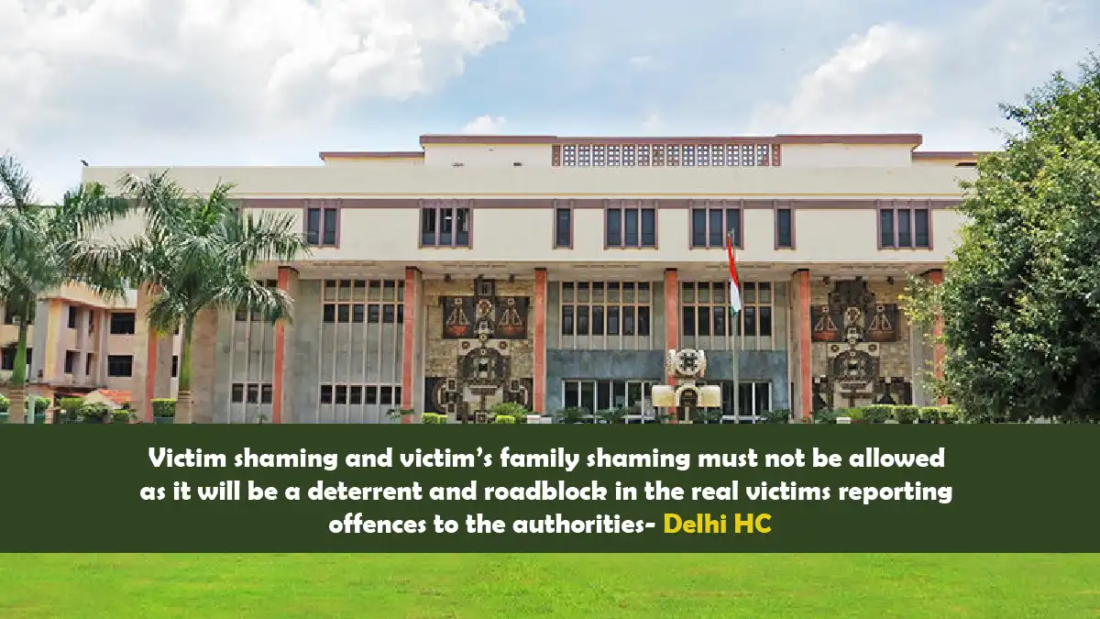Facts:
The case involved a child who was victimized within her home by an employee of her father, suffering voyeurism, sexual harassment, and outraging her modesty. The Accused/Appellant allegedly recorded videos of the victim while she was changing clothes using his mobile phone. On February 22, 2018, the victim saw the accused outside her window with a mobile phone and later discovered videos of herself on his device. The victim and her father filed a complaint, leading to the registration of FIR for offenses under Sections 354C and 509 of the IPC and Section 12 of the POCSO Act. The Trial Court convicted the appellant and sentencing him to three years of simple imprisonment and a fine of Rs. 1,000.
Contention of the Appellant:
The Appellant argued that the judgment and sentence were prejudged and lacked consideration of his submissions. He claimed false implication by the victim’s father, who allegedly planted the evidence. He highlighted discrepancies in witness testimonies and the investigation’s failure to verify the ownership of the mobile phone. He suggested the possibility of tampered evidence and biased testimonies from only family members. The Appellant requested acquittal or a reduction in sentence due to his young age and economic hardship.
Contention of the Respondent:
The Respondent, comprising the State and the victim’s counsel, emphasized that the appellant failed to present a defense and only refuted allegations as wrong. They argued that the trial court’s judgment was well-reasoned and that the forensic evidence corroborated the victim’s account. They pointed out the Appellant’s failure to rebut the presumption under the POCSO Act and highlighted the trauma and safety concerns experienced by the victim, arguing against leniency.
Court’s Observation:
The court noted minor discrepancies in witness testimonies regarding the timing of events but deemed them insignificant given the distressing circumstances. It stated that such discrepancies did not undermine the credibility of the victim and her mother’s testimonies. The court upheld the victim’s account, supported by forensic evidence, and the Trial Court’s judgment and sentence.
The Court also emphasized the importance of considering the reactions of a reasonable person or a victim of sexual harassment in such circumstances. The child victim, being in her late teens, and her shocked and unprepared parents were distressed. The record revealed that the victim was in utter shock and distress, and her father testified that she screamed after discovering the inappropriate videos on the appellant’s mobile phone. This incident caused mixed emotions of shock, distress, and embarrassment for the family. The Court observed that in such cases, decisions cannot be made mechanically by calculating the exact timings testified by witnesses but must consider the proximity of such timings and the entirety of the circumstances.
The Court observed that “When the judiciary takes a firm stand against child sexual harassment, it encourages victims and their families to report such crimes, reducing the stigma associated with seeking justice and ensuring that cases are handled with the utmost seriousness. In this background, this Court has observed in preceding paragraphs that victim shaming, and victim’s family shaming must not be allowed as it will be a deterrent and road block in the real victims reporting such offences to the authorities. Taking a lenient view in such cases will also discourage the real victims of such offences.”
Court’s Decision:
The Court rejected the appellant’s argument regarding the lack of evidence proving the ownership of the mobile phone and SIM cards, noting that the phone was found in his possession with call details related to him. The forensic evidence corroborated the prosecution’s case, including the expert witness’s testimony confirming the videos were retrieved from the appellant’s phone and were not manipulated. The victim correctly identified the three inappropriate videos during her testimony.
The Court dismissed the appellant’s argument about the lack of independent witnesses, stating that in such cases, the family’s immediate reaction would be to inform the police and seek help rather than calling neighbors to witness the incident. The appellant’s argument that the father planted the videos to avoid paying the appellant’s salary was deemed meritless and insensitive, as it would imply victim-shaming and family-shaming, which cannot be tolerated by the Court.
The Appellant’s request for leniency due to his age and economic hardship was also rejected. The Court noted the victim was preparing for her Class 12th Examination and the trauma she experienced affected her studies and led her to pursue further studies abroad. The Court emphasized the need for strict punishment to send a message to society about the seriousness of such crimes.
The Court found no grounds to set aside the Trial Court’s judgment or reduce the sentence, reaffirming the conviction under Sections 354C and 509 of the IPC and Section 12 of the POCSO Act. The appeal and pending applications were dismissed.
The judicial system has a paramount duty to protect vulnerable children from secondary trauma caused by unjust accusations or demeaning narratives. Judicial pronouncements in such cases play a critical role in providing justice to victims and deterring potential offenders. The Court recognized the profound impact of voyeurism on victims and their families, contributing to their psychological healing and encouraging victims to report such crimes without fear of stigma.
 Cart is empty
Cart is empty 

